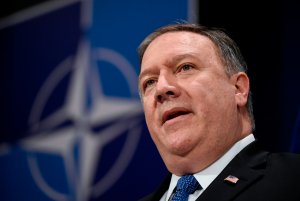Secretary of State Mike Pompeo said that President Donald Trump is unlikely to keep the US in the Iran nuclear deal past the next deadline to certify the deal in May.

“The President has been clear — absent a substantial fix, absent overcoming the shortcomings, the flaws of the deal — he is unlikely to stay in that deal past this May,” Pompeo told reporters during a press conference at NATO headquarters in Brussels.
Pompeo, on his first trip as the top US diplomat, also said the US and NATO were prepared to push back hard against Russia and congratulated South Korea and North Korea on their historic agreement to set aside their conflict and cooperate on denuclearizing their shared peninsula.
Until that happens, though, Pompeo warned that the “maximum pressure campaign” to exert financial and diplomatic pressure on North Korea will continue. Pompeo, who met secretly with North Korean leader Kim Jong Un, said he got the sense that Kim was serious about negotiations.
“I don’t want to say anything about the meeting itself,” Pompeo said, before adding that, “yes, I did get a sense that he was serious.”
“The economic pressure that has been put in place by this global effort that President Trump has led has led him to believe that it is in his best interests to come to the table and talk about de-nuclearization,” Pompeo said.
But he cautioned that history has shown the North Koreans to be wily negotiators and that many agreements in the past have been hailed, only to disintegrate. “There is a lot of history here where promises have been made, hopes have been raised and then dashed,” he said.
Trump is set to meet Kim for a summit, possibly in May. “In the event it fails,” Pompeo said, “respectfully President Trump will walk away and the pressure will remain, but in the event we reach a resolution, it would be a wonderful thing for the world.”
Pompeo will go from Brussels, where he has been meeting with NATO allies and focusing primarily on the threat from Russia, to the Middle East, where Iran will likely be the major point of discussion.
Trump has consistently denigrated the deal, calling it “insane” during a visit by French President Emmanuel Macron. His chief complaints are that the deal doesn’t cover Iran’s ballistic missile program or its regional activities, and that some clauses expire. The deal bars Iran from gaining a nuclear weapon regardless of the so-called “sunset clauses.”
Trump set a May 12 deadline for the US and Europe to address issues that aren’t covered in the nuclear deal, formally known as the Joint Comprehensive Plan of Action.
May 12 is the date by which Trump has to decide whether or not to continue waiving sanctions on Iran that were lifted under the Iran deal. Under US law, the President has to recertify the agreement every few months.
EU nations continue to strongly support the deal and have been working with US negotiators to find ways to address Trump’s complaints, but during Macron’s visit it seemed increasingly clear that the President will walk away and push for some other approach.
Sources familiar with Trump’s conversations with Macron suggest that a separate agreement is under discussion that has the force of a treaty that will exist alongside the original nuclear deal.
Pompeo said that “there has been no decision made” yet and the “team is working.”
He added that during his Mideast stops he would be talking about Trump’s concerns and “about ways to potentially address those shortcomings.”




















